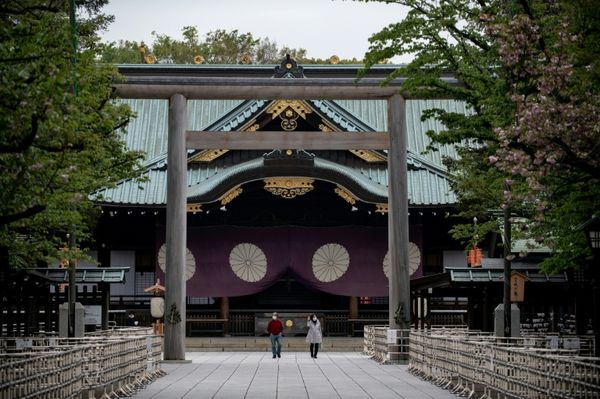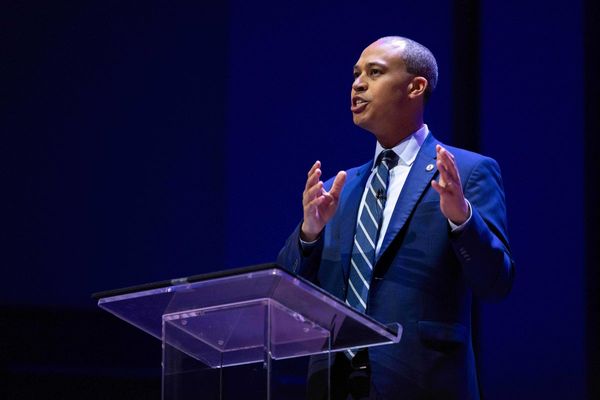
My father-in-law, Bryn, has been a loyal supporter of Manchester City for as long as he can remember. In the 1950s, he would jump on to the crossbar of his dad’s bike and journey from their home in Withington towards the famous terraces of Maine Road. On arrival, they would pay “thruppence” to park among the heaps of bikes piled on top of each other alongside the terrace houses around the stadium. His dad being a season-ticket holder, just like his own father, they would sit together near the players’ tunnel and more than 70 years later it takes little prompting to stir the memories, as strong as the smell of liniment, of his heroes emerging for each game before the assembled crowd and the eyes of that six-year-old boy.
Eleven years ago, during a work trip to America, my wife sent me a photo that caught me off guard. It captured my recently born son dressed in Manchester City’s sky-blue kit, a clear indication that he had been “claimed” by his grandfather to carry on their family tradition, a subversion successfully executed on all six of his grandchildren. Therefore, it was truly poignant for me to witness the entire family gathered together as his beloved team lifted the Champions League in June and achieved the historic treble for the first time in the club’s history: something they would have never dreamed about all those years ago sitting inside Maine Road.
His celebration, however, seemed a little subdued, suggesting a challenge in fully connecting those incredible events and the club of his grandchildren with the club of his own childhood. It raises questions as to what the direct line is between the team he has watched throughout his life and the club under the ownership of Sheikh Mansour, who was in Istanbul to watch only his second game in 13 years. With the club’s stadium now located in the east of Manchester, a team primarily composed of foreign superstars and sovereign wealth as the finance behind their ascendancy, the disparities between the past and present seem stark.
This question of what is the enduring nature of a football club over time can be illuminated by the philosophical concept the Ship of Theseus. Derived from Greek mythology, the story, also known as Theseus’s Paradox, serves as an ancient thought experiment delving into the notions of identity and change. It revolves around a ship that, upon the hero’s triumphant return from slaying the Minotaur, was preserved in Athens as a historical artefact.
According to the story, as the ship aged, its decaying parts were gradually replaced with new ones to maintain its structural integrity. Over time, every plank, mast and piece of the ship was substituted. The question then arose: if all the original components were replaced, could it still be considered the same ship?
This paradox challenges our understanding of identity over time. Is an object, person or organisation defined by its physical components or by something more intangible such as its history, purpose or cultural significance? If an object’s constituent parts are completely replaced, does it retain its original essence and continuity?

Although there may not be a definitive answer to the question of what endures, it appears that the threads guiding us through the labyrinth of time are either weakened or strengthened based on our alignment with our own identity and values. As the physical infrastructure of a football club undergoes upgrades and changes, it becomes increasingly challenging to establish a direct line connecting today’s achievements with the club’s past. It is crucial to recognise that while our relationship with a club is rooted in a shared story and collective memories, there is also a need to align with our present-day values and that is where ownership plays a significant role.
Ownership sets the tone and establishes the moral priorities of an organisation. Owners determine how a club aligns itself with its past and its fans, encompassing longstanding supporters and newcomers. The decisions made by ownership shape the club’s orientation and its ability to honour its history while meeting the expectations and values of its supporters in the present.
This is part of the complexity of foreign ownership. In one way it can be seen as a natural extension of our capitalist system, where ownership is determined simply by those with the most substantial financial resources. On the other hand, many of the countries that are the source of the capital may have different theories of justice or societal norms to the countries in which the football clubs are located.
It is that primacy of capital that often makes football fans looks sideways to all other considerations and is the source of the moral dissonance that lurks in the background of every cup that is lifted, every marquee signing made and every new stadium built. That slight unease is the experience that anyone who has holidayed in Dubai may understand, where western behaviour and appetites are catered for in a sea of Islamic orthodoxy and tradition.
Football may have modernised and gone global but the persistence of the connection to our clubs is rooted in our relationships to one another as much as to the institutions created over time. Our collective memory can survive even the most dramatic of physical changes and the vagaries of different ownership structures that will ultimately come and go.
Football clubs, like the Ship of Theseus, sail in an ocean of memory and what we navigate by is not only those memories but our orientation to those around us today and those who have come before us. The inherited loyalty, the constancy of our club colours, the match-day rituals we share, the performances, good and bad, all create the sense of a common life and help anchor our identity in communities and, ultimately, remind us of our love for a place and for one another.
Jason Stockwood is the chair of Grimsby Town







